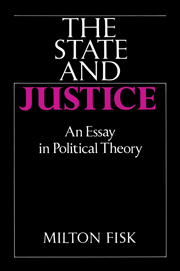Book contents
- Frontmatter
- Contents
- Preface
- Introduction: Can the state rule without justice?
- Part One An outline of a materialist political theory
- Part Two An assessment of the place of justice in the state
- Part Three A functional view of political institutions
- 11 On functional explanation
- 12 Power and function
- 13 Democracy, its bright and its dark sides
- 14 Welfare capitalism
- 15 The new mercantilism
- 16 Organized labor and the state
- Part Four An account of the community of states
- Part Five A reflection on the transition to a new kind of state
- Conclusion: State, class, and democracy
- Notes
- Index
- Frontmatter
- Contents
- Preface
- Introduction: Can the state rule without justice?
- Part One An outline of a materialist political theory
- Part Two An assessment of the place of justice in the state
- Part Three A functional view of political institutions
- 11 On functional explanation
- 12 Power and function
- 13 Democracy, its bright and its dark sides
- 14 Welfare capitalism
- 15 The new mercantilism
- 16 Organized labor and the state
- Part Four An account of the community of states
- Part Five A reflection on the transition to a new kind of state
- Conclusion: State, class, and democracy
- Notes
- Index
Summary
Welfare spending is not the only way the state intervenes in the economy. Income maintenance has an impact on consumer demand that is functional for an economy that generates its own unfavorable conditions for investment. The state has other, more direct ways of supporting the accumulation of capital, ranging from subsidies for private production to helping negotiate the conditons for private investment abroad. Direct support to capital is won in the political process through the formation of a political alliance that often includes organized labor. This direct support is a key factor in the ability of capitalists to organize their economy. The period of state intervention called mercantilism that lasted from the sixteenth through the eighteenth centuries was followed by laissez-faire, but now the extent of direct state support for capital accumulation has become so great that we are warranted in speaking about a new mercantilism.
Thinking about functions
This area of state activity displays the functional character of the state if any area does. Unfortunately, the fad that has made functional thinking unpopular has blinkered people to the patent functionality of direct state support for capital accumulation. This fad is based on a mistake that can be cleared up on the basis of what was said in Chapter 11. The fad emphasizes concrete social and political situations, called historical conjunctures, rather than functional links. The mistake is to make this an either–or matter, thereby requiring the rejection of the functional element if any play is to be given to the conjunctural one.
- Type
- Chapter
- Information
- The State and JusticeAn Essay in Political Theory, pp. 193 - 203Publisher: Cambridge University PressPrint publication year: 1989

